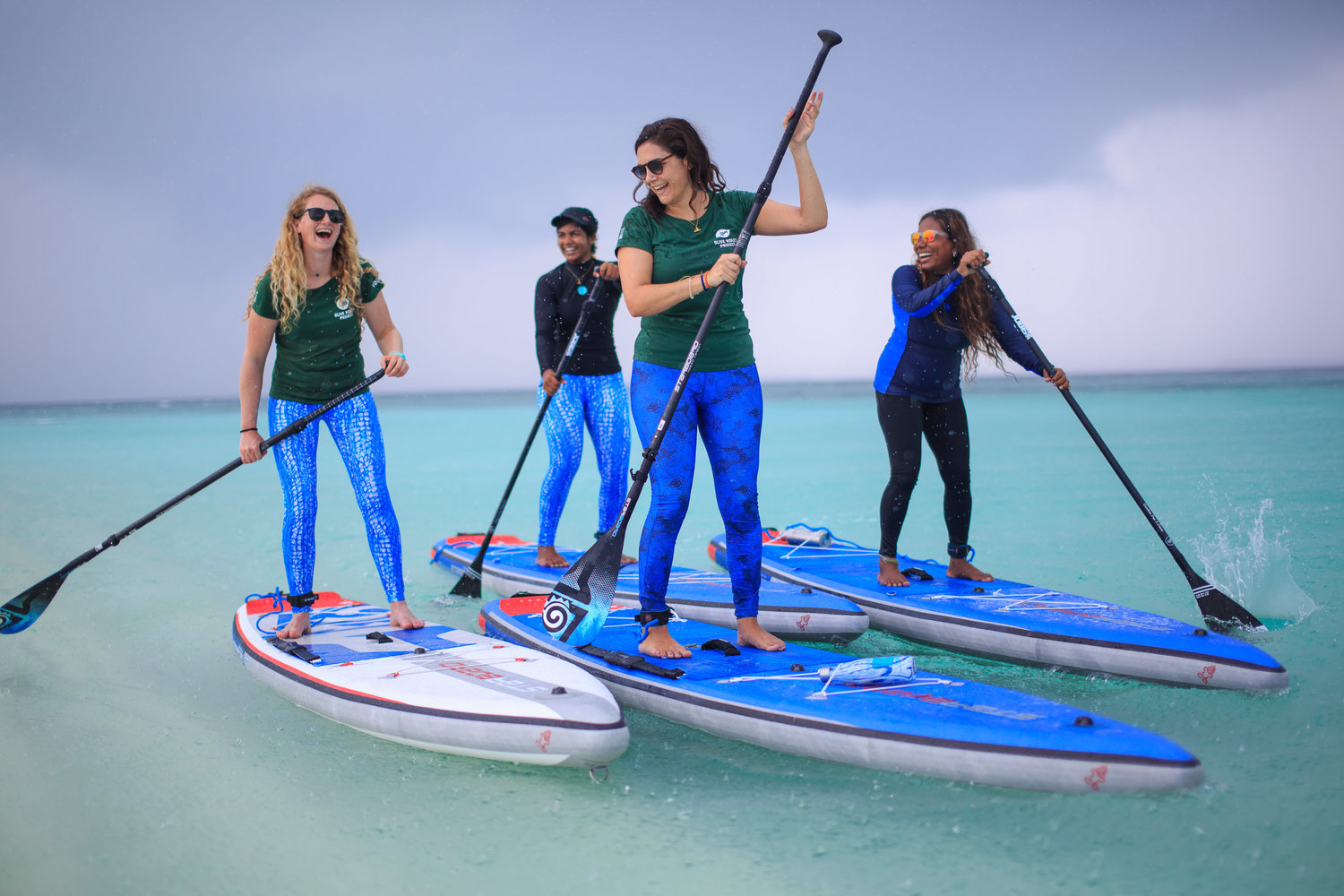Stand Up For Our Seas - Maldives Expedition 2019
In February 2019, four women completed an unprecedented stand up paddle-boarding (SUP) expedition in Baa Atoll in the Maldives, raising awareness of the need to protect marine life, and the necessary actions to do so.
Dr Claire Petros and Dr Cal Major, veterinarians from the UK, along with Maldivian Ocean Advocates Saazu Saeed and Dhafy Hassan Ibrahim, paddled a gruelling 100km over 8 days, the likes of which has never been done before in the Maldives. The women paddled in the beating sun, fighting dehydration and exhaustion, through unseasonal headwinds and waves and against strong currents, between 16 islands of the Atoll.
The mission of SUFOS was to raise awareness of the threat of plastic pollution and climate change to the The Maldives, while encouraging more people to work for the common cause of protecting marine life. Ocean Ambassadors is proud to have supported this expedition.
Photo: Stand Up For Our Seas/James Appleton
The team was also supported by environmentalist Rob Thompson of Odyssey Innovations, award-winning photographer and videographer James Appleton, and Shameel Ibrahim of the Olive Ridley Project as they visited schools, islands and resorts, giving presentations, and running beach and harbour clean ups. A key aim of the trip was to investigate the myriad of solutions to plastic pollution and climate change already in place in the country, with the aim of inspiring further positive change.
the threat of Plastic pollution and climate change to a pristine marine environment
The Maldives is renowned for its pristine marine environment and abundance of wildlife, but it is also vulnerable to plastic pollution, coral bleaching and climate change. Thousands of marine creatures every year are entangled in lost or discarded fishing nets. Thousands more ingest plastic fragments, causing starvation and poisoning the food chain.
As the lowest-lying country in the world, The Maldives is made up of more than 1100 islands surrounded by coral reefs which support the ocean ecosystem. Due to warming seas, these corals are becoming bleached, with progressively less ability to regenerate. The rising sea levels are severely threatening the islands, with estimates projecting that they will be under water in 12 years if current trends continue.
The SUFOS team were privileged enough to encounter turtles, dolphins and manta rays during the paddling, bringing home the importance of protecting the oceans around the world. They also encountered uninhabited islands covered in plastic bottles, enormous ghost fishing nets on beaches regularly used by turtles for nesting, and harbours packed with plastic.
Photo: Stand Up For Our Seas/James Appleton
““Having treated sea turtles with life threatening entanglements caused by plastic pollution and ghost fishing gear, I have witnessed first hand just how much suffering and damage each animal affected by this man made problem has to endure.” ”
Plastic pollution is a huge issue with recent global media attention. It is a global problem, and experiencing it here, juxtaposed by wildlife, highlighted the importance of the need to tackle this problem urgently and globally. The oceans are all connected and are vital to support life on Earth, producing over 50% of the oxygen in the atmosphere. Dr Claire Petros says: “Having treated sea turtles with life threatening entanglements caused by plastic pollution and ghost fishing gear, I have witnessed first hand just how much suffering and damage each animal affected by this man made problem has to endure.”
Celebrating solutions and inspiring change
An important part of the expedition was to engage schools, and this was particularly important to Dhafy and Saazu, who regularly run events with children to help them understand how amazing our oceans are. The team are deeply passionate about protecting the oceans wildlife, ensuring a healthy planet for the next generation. As Cal Major writes: “Our messages were universal and non-critical. We were not there to shame or guilt anybody, but rather celebrate the solutions in place to inspire further change, and to help people to see the importance of caring for the environment.”
““It’s not about feeling guilty for what we don’t do, but about feeling proud about what we can do””
The team delivered 3 school talks, and in one school the children gave their own presentation about the work they were doing to manage waste on their island. Each local island they visited was different, with varying levels of commitment to removing single use plastic, however the majority of the children they spoke to were connected to the importance of the ocean, even if just through the importance of fish in their diet.
The reception to the SUFOS team was phenomenal, with local islands and resorts alike excited to share the positive changes they already had in place, proud to protect the local marine life, and eager to learn more. Many schools were working towards becoming plastic free, and as well as receiving the team's presentations, were encouraged to give their own accounts of the waste management practices being initiated on their home islands.
a Global call to action
The team met with Dr Hussain Rasheed, the Minister of Environment, before setting out on their voyage, and his message was a clear global call to action: The Maldives is taking responsibility for its own carbon emissions, aiming to become the first carbon-neutral country. They are supporting plastic free schools programmes, and helping islands to become plastic free. Resorts are answering consumer demands to use less plastic, and most have desalination plants to make drinking water, removing the need for plastic water bottles. Fishing with nets is not permitted in the Maldives; pole and line methods are widely used instead: The nets arriving in ocean currents into the Maldivian waters, entangling the megafauna here, are usually from further afield.
Even with the Maldives making all the changes within their power, it is up to the global community to take action to prevent carbon emissions and climate change from irreparably destroying this country.
The expedition received copious in-country media attention and support, and was used as a vehicle to encourage continued positive change, and to inspire global action.
“I believe in positive, collaborative change. The momentum in the movement tackling single use plastic is proof of this - individual voices coming together to demand change from the government, companies and businesses, and change is happening!”
Behind the scenes documentary - coming soon
Photo: Stand Up For Our Seas/James Appleton
The expedition was documented by award-winning photographer and videographer James Appleton to capture the journey into the incredible wildlife in this country, the issues it faces, and the solutions that will help to protect it.
The call to action is that we can all be proud to make small changes and contributions to these solutions at a local level, which help to alleviate these important global issues.
the Effects of Plastic pollution on turtles
Dr Claire Petros, Lead Veterinarian of the Olive Ridley Project, treating a sea turtle
Turtles have become the face of the campaign against plastic pollution, and are readily affected by discarded fishing nets and marine litter. Dr Claire Petros, lead veterinarian of the Olive Ridley Project, a charity rescuing and rehabilitating injured turtles in the Maldives, has seen first hand the threat ocean plastic pollution poses. Prior to the SUP expedition, Claire and Cal were also involved in identification and rescue of turtles in lesser visited atolls. You can read more about this on their dedicated blog post.
Photo: Stand Up For Our Seas/James Appleton
Cal’s blog
Dr Cal Major has written up a blog post covering this expedition in more detail which you can read on her website.












